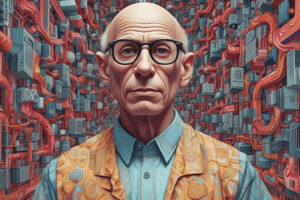Podcast
Questions and Answers
What is the Archaeology of Knowledge according to Michel Foucault?
What is the Archaeology of Knowledge according to Michel Foucault?
A methodological approach to analyze the historical development of knowledge systems over time, considering social contexts and power relations.
How does the Archaeology of Knowledge differ from analyzing logical coherence of ideas?
How does the Archaeology of Knowledge differ from analyzing logical coherence of ideas?
It focuses on historical development rather than logical coherence.
What does the perspective of Archaeology of Knowledge reveal about knowledge systems?
What does the perspective of Archaeology of Knowledge reveal about knowledge systems?
That knowledge is constantly being produced and reproduced in specific conditions.
Define Disciplinary Power as conceptualized by Michel Foucault.
Define Disciplinary Power as conceptualized by Michel Foucault.
How does Disciplinary Power affect individuals according to Foucault?
How does Disciplinary Power affect individuals according to Foucault?
What are some examples of mechanisms through which Disciplinary Power operates?
What are some examples of mechanisms through which Disciplinary Power operates?
What are some institutions involved in the circulation of knowledge about 'normal' behavior?
What are some institutions involved in the circulation of knowledge about 'normal' behavior?
How does disciplinary power operate according to Foucault?
How does disciplinary power operate according to Foucault?
What is the difference between Foucault's view of power and some Marxist theories?
What is the difference between Foucault's view of power and some Marxist theories?
According to Foucault, what should guide the exercise of power in politics?
According to Foucault, what should guide the exercise of power in politics?
How does Foucault suggest we can resist or reconfigure power in society?
How does Foucault suggest we can resist or reconfigure power in society?
What does Foucault's analysis of power and knowledge offer in terms of political manipulation?
What does Foucault's analysis of power and knowledge offer in terms of political manipulation?
Flashcards are hidden until you start studying
Study Notes
Foucault's theory of power and knowledge has been influential in understanding various aspects of society, including its manipulation in politics. This article discusses three major concepts from Foucault's work: Archaeology of Knowledge, Disciplinary Power, and Politics.
Archaeology of Knowledge
Archaeology of Knowledge is a methodological approach proposed by Michel Foucault to analyze how different types of knowledge systems have evolved over time. It involves studying the historical development of ideas rather than their logical coherence. This perspective allows us to understand knowledge systems more broadly, taking into account social contexts, institutional arrangements, and technological changes that influence the production and dissemination of knowledge.
In this framework, knowledge isn't seen as a static object but as something constantly being produced and reproduced in specific conditions. By examining these conditions, we can uncover the power relations embedded within them. For example, researchers using archaeology of knowledge might investigate how certain forms of knowledge become dominant during particular periods, leading one to question why this is so, who benefits from it, and what alternative ways of knowing could exist.
Disciplinary Power
Disciplinary power, as conceptualized by Foucault, refers to the mechanisms by which power operates on individuals to shape their behavior. This involves the creation of institutions like schools, hospitals, and prisons that circulate knowledge about 'normal' behavior. People then internalize these norms, conforming to them willingly or else facing the threat of punishment. This form of power is not coercive but rather productive, shaping individuals and therefore society.
Disciplinary power operates through processes such as examination, confession, and normalization. These processes serve to control, monitor, and discipline individuals, ensuring they conform to the norms set out by those in positions of power. However, this also allows individuals to resist or reinterpret these norms, potentially leading to shifts in power dynamics.
Politics
Foucault's political thought is rooted in his concept of power. Unlike some Marxist theories, he doesn't see power as a thing held by elites, but as a network of relationships. Power is not something that can be grasped or possessed but something that is always in play, circulating through interactions.
In his later work, Foucault also focused on the role of ethics in politics. He argued that ethics should guide the exercise of power, ensuring it remains just and respects the fundamental rights of individuals. This approach contrasts with traditional political theories that focus on rules, laws, and regulations to control society. Instead, Foucault suggests that ethics can help us understand the everyday operations of power, allowing us to resist or reconfigure it.
In conclusion, Foucault's theories of power and knowledge provide a unique perspective on political manipulation. By studying the historical development of knowledge systems, the operations of disciplinary power, and the role of ethics in politics, we can gain a deeper understanding of how power functions in society and how to resist or reconfigure it.
Studying That Suits You
Use AI to generate personalized quizzes and flashcards to suit your learning preferences.





